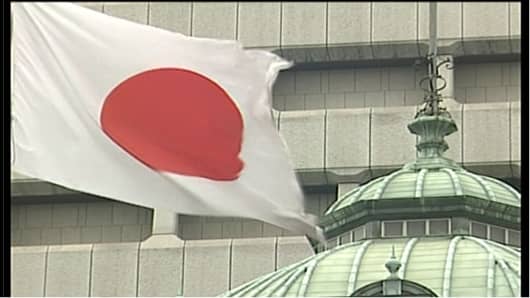The central bank also cut its economic outlook saying the strains in global markets had increased and the world economy faced severe conditions for some time.
The markets had widely expected a cut to 0.25 percent and Yuji Saito, head of fx sales at Societe Generale in Tokyo, said the split decision and smaller cut may send the wrong signal.
"Today's decision may give an impression to foreign investors that the Bank of Japan will not be able to manage rate decision flexibly," he said.
In a sign of political pressure on the central bank to move, Finance Minister Shoichi Nakagawa said earlier on Friday the BOJ must work closely with the government.
"I want the government and the BOJ to cooperate closely in policy management and have a shared understanding of the current state of the economy and financial markets," he told reporters.
It was not immediately clear what the four BOJ policy board members who opposed the cut had wanted instead.
The rate cut comes two days after the U.S. Federal Reserve cut rates by 0.5 percentage point to 1 percent.
China, Hong Kong and Taiwan also cut rates this week, with the European Central Bank and Australia seen following suit next week, in the midst of a sharp deterioration in major economies.
"A harsh storm seen only once in 100 years is raging," Prime Minister Taro Aso said on Thursday, as he unveiled a $51 billion stimulus package -- the government's second in two months.
Looming large at the BOJ meeting was volatility in financial markets, which have taken Japanese shares to their lowest levels in 26 years this week and pushed up the yen to a 13-year high against the U.S. dollar last week.
The yen gained against the dollar and Japanese government bond futures trimmed losses after the rate cut. The dollar dropped almost half a yen to 98.00 yen while December JGB futures trimmed losses to around 137.90 from around 137.07.
Perhaps strengthening the case for a rate cut was a dip in annual inflation to 2.3 percent as oil prices have plunged from record highs in July.
More From CNBC.com ...
- Credit Spreads and Libor Data
- Futures and Pre-Market Data
Previously, the BOJ has been reluctant to join the global push to ease monetary policy as it regarded rates as low enough.
A gradual retreat in Japanese inflation from decade highs would allow the central bank to concentrate on economic risks, with it tipped to slash growth forecasts later on Friday.
The central bank's board members are expected to forecast growth of only around 0.5 percent or less in both 2008/09 and 2009/10, less than half its previous forecasts in July of 1.2 percent and 1.5 percent, respectively.
Central Banks Struggle to Keep Ahead
Policymakers have been struggling to get ahead of a rapid slowdown in the global economy that has hurt corporate profits and which sparked a record freefall in global stock markets in October.
There were some signs rate cuts from Beijing to Washington and massive doses of liquidity were unlocking short-term financing for banks and improving investor sentiment.
A top Australian policy maker on Friday said there were signs the Federal Reserve's massive expansion of U.S. dollar swaps with other central banks seemed to be working to ease pressures in global markets.
The rate cut from the Bank of Japan is expected to hammer home a message that policymakers worldwide were willing to do whatever it took to shelter their economies from the worst financial storm in 80 years.
"They want to send a message of coordinated international action about the poor economy, a message that is extremely important for markets," said Yutaka Miura, a senior technical analyst at Shinko Securities in Tokyo.
The economies of Britain, Europe, Japan and the United States are contracting. The latest date on gross domestic product showed the U.S. economy shrank in the third quarter, three months that ended with the dismantling of Wall Street in September.
Policy maker efforts were showing some signs of turning investor sentiment. The MSCI all-country world equities index is set for its biggest weekly rise since the gauge started 20 years ago.
China reduced its benchmark rate for the third time in two months earlier this week and the U.S. Federal Reserve eased its rate on Wednesday to the lowest level since June 2004. Australia, Britain and the euro zone were expected to cut rates next week.
Along with central banks, governments around the world were waging an all-out battle to contain the fallout from the financial crisis, including tax cuts, taking equity in banks and backing bank deposits.
On Thursday, Japan unveiled a $51 billion economic stimulus packageand German cabinet minister Michael Glos said the European country planned to introduce a range of steps worth up to $39 billion.
The Fed alone has made available through swap lines a sea of U.S. dollars to central banks globally so they can meet financing demands.
"Overall, it appears this has had some success with conditions in the U.S. dollar swap markets improving over the last few weeks, and the cost of U.S. dollar funding declining to more normal rates," said Reserve Bank of Australia Assistant Governor Guy Debelle at a conference.
The U.S. economy shrank at a 0.3 percent annual rate in the third quarter, the sharpest contraction in the United States in seven years. U.S. consumers slashed spending at the fastest rate in 28 years in the third quarter.


